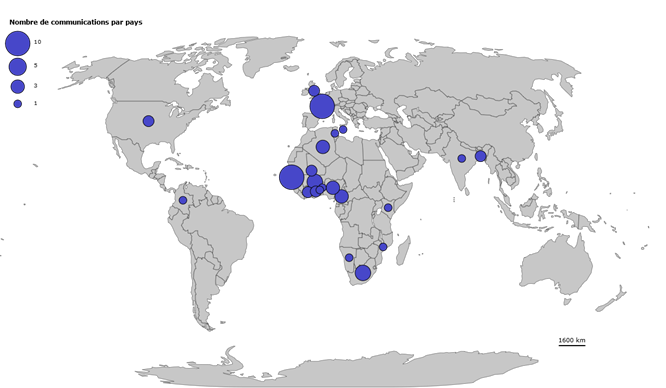Feedback on the XVIII CODATU Conference
The XVIII CODATU Conference took place in November 2021, around the theme: “Research and policy merge: present challenges in urban transport and mobility for passengers and goods in developing and emerging countries”. During this event, more than 70 researchers gathered to present 45 scientific papers peer-reviewed by the Scientific Committee of the XVIII Conference, falling under 10 themes. Some of the papers used as support for the presentations made at the Conference are available for download below. Papers referenced in italics are not available, especially if the authors choose to submit their paper for publication in a scientific journal.
- Urban spaces and mobility
ATTARD M., GUZMAN L., OVIEDO D. Urban space distribution: the case for a more equitable mobility system
MACHANGUANA C. Space dynamics and urban transport governance, the case of the metropolitan region of Maputo, Mozambique
OVIEDO D., CAVOLI C., JONES P., LEVY C., KOROMA B., ROMERO DE TEJADA J. T-SUM research findings: Voices of Freetown’s urban mobility transition
RIVASPLATA C. Integrating bicycles and public transport in the developing world: the case of Santiago, Chile
KERZHNER T. The diverse dynamics of paratransit: learning from labor across African cities
- Introducing new types of technologies in the transport and mobility sector in Africa
DINDJI R. Taxi-tricycle à énergie solaire en Côte d’Ivoire
ZEGHA A. Nouvelles technologies et transport à la demande au Cameroun : Cas des moto taxis
BOUTUEIL V., QUILLERIER T. Essor et stratégies des plateformes numériques de mobilité partagée dans les métropoles africaines
- Users’ perception on new information and vehicle technologies
RYSECK B. User information needs for hybrid public transport systems in Cape Town
OVIEDO D. SCORCIA Y., NIETO M., PEREZ D., SCHOLL L. Thinking about regulation of ride-hailing from a perspective of transport-related social exclusion
ESCOBAR D., MONTOYA J., MONCADA C. Spatial coverage analysis of public transport bus-stops through a citizen perception study in Manizales (Colombia)
ACKAAH W., KANTON A., ADAMS C. Adoption of electric vehicles: analysis of consumer perception in Ghana
- Road safety: policy issues
CARNIS L. Nouveaux regards, nouveaux défis en sécurité routière : les contextes africains
CARNIS L., MIGNOT D. Eléments d’évaluation du Plan d’action Africain pour la sécurité routière issus du projet Safer Africa
BOUHAMED N., CHARFI F. Repenser le management de la sécurité routière en Tunisie : Penser national et agir local
NIKIEMA A. Les Volontaires adjoints de la sécurité routière : l’ambiguïté de la politique menée au Burkina Faso
- Road safety: perception and consequences
DUKIYA J., ABIODUN M., GAHLOT V. Emergency ambulance service scheme and e-call in road traffic accident rescue operation
HEYNS G., LUKE R. Young people’s perceptions of the road safety aspects in developing countries: a South African perspective
OUEDRAOGO M., BONNET E., BANDRE E., RIDDE V. Les enfants accidentés de la route à Ouagadougou : étude prospective au centre hospitalier universitaire pédiatrique Charles De Gaulle
AKINYEMI Y. Exploring child restraint use in motor vehicles and barriers to their use
- Informal transport and paratransit services in African cities
YAYE SAIDOU H. Se déplacer, un casse-tête quotidien dans le quartier Bassora (Niamey)
SIGUE O. Les taxis artisanaux, révélateurs de la complexe question des transports à Ouagadougou
DEMBELE S., OUOLOGUEM M., TELLY M. Le transport artisanal à Bamako : Analyse de la desserte des Sotramas à la Rive-Sud du District de Bamako
ADJEROUD H., LAMMOGLIA A., CHAPELON L. Diagnostic d’un réseau de transport artisanal dans une ville moyenne algérienne : le cas de Mila
SAMAKE C. FOFANA S. Transports informels et conditions de travail des chauffeurs de minibus à Yirimadio /Bamako (Mali)
- Planning urban spaces for Non-Motorised Transport
CAPRON G., GIGLIA A., MONNET J., PEREZ-LOPEZ R. Le trottoir, un ordre urbain hybride
NATHNAEL H. A walkability audit for the visually impaired in Windhoek City, Namibia
CAP C. Lessons from multiplicity of uses of non-motorized infrastructure in Nairobi, Kenya
ADAMS C., DZISI E. Assessment of bicycling transportation on a Ghanaian university campus
NDIAYE I., NDONKY A., SYLLA F., SOW B. C. Les modes actifs à Dakar : déterminants de l’usage et apports dans la politique intermodale
- Public transport issues in African cities
LESTEVEN G., BOUTUEIL V. Planification des transports urbains en Afrique de l’Ouest : de nouveaux schémas ?
DIABATE L., NDIAYE A. Proposition d’un schéma de développement du transport lagunaire de personnes dans la ville d’Abidjan
BOULAHBAL M., MICHAILOVSKY A., GODARD X. Processus d’intégration institutionnelle, physique et tarifaire d’un Mass Rapid Transit System
TRIKI N., BACHIRI H. L’usage des transports collectifs urbain d’Oran : entre perceptions et réalités
- Transport planning and decision tools
REVILLON D., AW T., CISSE K., BALDE M., NDIAYE I., SEBES A. Un modèle multimodal pour l’agglomération de Dakar
DE BEER L., VENTER C. Priority Infrastructure for Minibus-Taxis: an analytical model of potential benefits and impacts
MFOULOU J-P., EPO NGAH B., ONGOLO-ZOGO V. Les déterminants du choix du mode de mobilité à Yaoundé (anciennement Mobilité quotidienne et lien social à Yaoundé)
KANT P., GUPTA S. Efficiency assessment of major freight handling areas in case city of Jaipur, North India
- Special session on transport in Dakar
DIAZ-OLVERA L., PLAT D., POCHET P. Mobilités quotidiennes et transports collectifs à Dakar, évolutions 2000-2015
DIOP K. Quand l’infrastructure autoroutière Dakar-Diamniadio accentue les difficultés d’accès aux transports
DIOUF F., FALL M. B. La desserte nocturne à Dakar, au Sénégal
Even though most of the research presented deals with African fieldwork, researchers involved in the Conference are affiliated to institutions worldwide.

